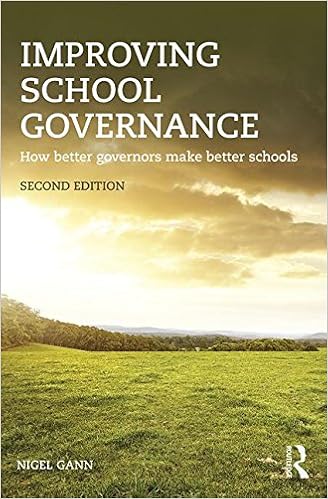The recently published White Paper Education, Excellence, Everywhere has made clear the government's determination that all schools become academies by 2022, with most having to join Multi Academy Trusts. In one way we're just going to have to get on with it and I advocate a pragmatic approach here. But Parliament's Education Committee has just launched an inquiry into MATs and one area that they'll be looking into is, "The balance of decision-making at the individual school level and at the chain level, and the appropriateness of formal governance structures employed". As I see it that is the big problem with the Multi Academy Trust model of school governance. The balance of powers is too one sided in favour of MAT boards. This may be summed up in terms the wording found in the November 2015 Governance Handbook, which reflects the current legislation covering MATs:
A MAT board is accountable for all of the academies within the trust. However, it can choose to delegate governance functions to local governing bodies or LGBs... It is the decision of the trustees about which, if any, governance functions they delegate to LGBs or other committees. (4.2.2 Multi Academy Trusts, 16 & 17.)
LGBs are little more than committees of the MAT board and the powers delegated to LGBs or even their very existence are in the gift of the the MAT board. The situation is akin to governance in a maintained school or stand-alone academy. The full governing board may choose to delegate certain powers to committees, and then decide to get rid of one committee and distribute its powers to others, or exercise them itself. That is fair enough when it comes to a governing board of a local school reviewing its Scheme of Delegation and governance structures, but it amounts to a serious loss of autonomy for LGBs in a MAT. Even if the MAT may accord DevoMax powers to LGBs on joining the group, it may later reverse that decision and turn its LGBs into focus groups or abolish them altogether.
I would like to see the legislation reformed so as to accord certain inalienable rights to local governing boards in relation to the MAT board. Those rights would also entail binding responsibilities for a LGB. The points below are not intended to serve as a complete Scheme of Delegation, but set out a number of underlying principles for consideration:
The rights of LGBs in a MAT
1. LGBs should have the right to exist and not be unilaterally abolished by the MAT board.
2. LGBs should have the right to exercise the core functions of governance in relation to their local school: a) Set the school's vision, ethos and strategy. b) Hold the Headteacher to account. c) Ensure value for money. A body that does not exercise these core functions cannot be said to be governing their school in any meaningful sense.
3. LGBs should have the right to equal or at least equitable representation on the MAT board.
4. As far as distributed powers of governance are concerned, no change should be made to the MAT Scheme of Delegation without the agreement of a majority of constituent LGBs.
5. The MAT board should report to an annual LGB conference where local governors would have an opportunity to hold the MAT board to account for its actions.
The responsibilities of LGBs in a MAT
1. LGBs will account to the MAT board for its school's progress against a set of agreed Key Performance Indicators and operate on the basis of earned rather than absolute autonomy.
2. Where an LGB is not giving its school the strategic leadership it requires, the MAT board may suspend its 'earned autonomy'. In that case the MAT board may intervene to direct the LGB's actions up to and including changing the leadership and composition of the local board.
3. In fulfilling its core functions the LGB will oversee the effectiveness of its school's leadership and management, and monitor measures taken to improve the quality of teaching. It will scrutinise pupil outcomes, and ensure actions are taken to secure the personal development, welfare and safety of pupils. The LGB will report to the MAT board on its work as required so the board is apprised of the strengths and weaknesses of member schools and can take action as appropriate.
4. While ensuring compliance with the MAT-wide vision, standards and policies, the LGB will safeguard its school's distinctive ethos and character.
4. While ensuring compliance with the MAT-wide vision, standards and policies, the LGB will safeguard its school's distinctive ethos and character.
5. The LGB will engage with key stakeholders, pupils. parents, staff and members of the local community so that the MAT board is made aware of their views and is able to take them into account when considering its strategic priorities.
I believe that redistributing the powers of governance as outlined above would make for a more effective self-improving school-led system. Harris Academies have 'authoritative' LGBs that provide strong strategic leadership and robust accountability to individual academies. E-ACT notoriously abolished its LGBs. No prizes for guessing which 'chain' is doing better when it comes to improving pupil outcomes. Even in MAT-land, governance by appropriately skilled-up and fired-up local stakeholders has its place.
Reform of the legislation that accorded clear rights and responsibilities to LGBs in relation to MAT boards would also help to allay the fears of governors and Headteachers who are reluctant to contemplate joining a MAT because of the loss of autonomy that would entail. If local freedom was respected as well as the power of collective action harnessed in MATs, that would make joining one a more enticing prospect. If a ReforMATion of school governance isn't forthcoming, the next best thing would be for schools to academise together under an Umbrella Trust, but who knows whether we would be allowed the autonomy to do that?
I believe that redistributing the powers of governance as outlined above would make for a more effective self-improving school-led system. Harris Academies have 'authoritative' LGBs that provide strong strategic leadership and robust accountability to individual academies. E-ACT notoriously abolished its LGBs. No prizes for guessing which 'chain' is doing better when it comes to improving pupil outcomes. Even in MAT-land, governance by appropriately skilled-up and fired-up local stakeholders has its place.
Reform of the legislation that accorded clear rights and responsibilities to LGBs in relation to MAT boards would also help to allay the fears of governors and Headteachers who are reluctant to contemplate joining a MAT because of the loss of autonomy that would entail. If local freedom was respected as well as the power of collective action harnessed in MATs, that would make joining one a more enticing prospect. If a ReforMATion of school governance isn't forthcoming, the next best thing would be for schools to academise together under an Umbrella Trust, but who knows whether we would be allowed the autonomy to do that?






